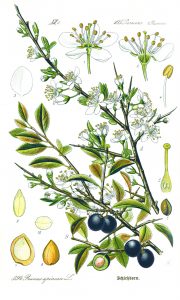Tree Lore – Blackthorn
The Blackthorn, which is widespread and abundant in woods and hedgerows throughout the British Isles, has the most sinister reputation within Celtic folklore, in ancient Ireland it was known as Straif, thought to be the origin of the word strife.
Although associated with trouble and bad luck, it is also associated with the overcoming of these negative aspects and the transformation that this struggle can bring.
Cailleach the Celtic goddess of winter is depicted as a blue veiled old woman with a raven on one shoulder and a blackthorn staff which she uses to summon storms. She emerges at Samain and takes over the year from the summer goddess Brigid.
In Irish mythology the Blackthorn is inhabited by the Lunantisidhe, or moon fairies.The Lunantisidhe are thin and wizened in appearance. They have long pointed ears and long teeth. Their long arms and fingers enable them to climb easily. They are an unfriendly race of creatures who curse those who disturb the plant at Samhain or Beltane. They leave the bushes at full moon in order to worship the moon goddess, so this is considered the safest time to cut wood to make shillelaghs or harvest the berries of the plant (sloes).
Witches were said to make staffs and wands from the wood of the plant and the thorns were used to prick wax images of those that they cursed. The crown of thorns that Jesus was forced to wear is reputed to have been made from the Blackthorn.
It is thought that this is one of the trees which crosses the barrier between this world and that of the spirit or fairie. Meditating under the tree would allow you to talk to these beings, but an amulet is necessary in order for you to return.
Much of the plant’s reputation is probably due to the black bark and the long viciously sharp thorns which cover it. Scratches from these thorns often go septic. Although the fruit of the tree is the ancestor of all our cultivated plumbs, the wild sloe is one of the most bitter fruits and just biting into the green flesh will cover your mouth with fur.
But overcome these obstacles and the berries can be used to make a fast, pale blue dye and all parts of the plant are said to have medicinal properties.
Possibly the most common use of the plant though is in the production of Sloe Gin. The sloes are traditionally harvested in September/ October after the first frost has “bletted” the fruit and removed some of the acidity. (In the modern world this can be simulated by freezing the fruit after harvesting.
Sloe Gin
- Sterilise a 1 litre screw top jar with boiling water and empty it.
- Take 1lb of washed sloes (removing any leaves or insects) and add them to the jar after pricking the berries
- Add 4oz white sugar and a 75cl bottle of gin*. (Keep the bottle sealed, the remains of the gin will keep the bottle sterilised until you refill it)
- Cover the neck of the jar with cling film and then seal the lid.
- Store in a cool, dark place for at least 2 months shaking every day to help dissolve the sugar.
- After 2 months you can strain the fruit out of the liquor and rebottle the ruby coloured liquid.
The sloe gin will be ready in time for Christmas, but is even better if you can resist and keep it until the following year.
*There is some argument about the gin to use, with people often claiming that cheap gin will ruin the taste. I think that using an expensive gin is a waste, but you do need to make sure that the base spirit is drinkable before using it to make sloe gin.


Are you sure that lunantisidhe isn’t a mispelling of lonandesidhe? It would pronounced basically the same. Lonan – blackbird; -de suffix that turns noun into adjective. Blackbird-like Faeries lonandesidhe. Luna (moon) isn’t a gaelic word. What source material are you referencing for this article? given that blackbirds sometimes visit and eat blackthorn trees, it wouldn’t be unreasonable to guess that they influenced the image of faeries associated with blackthorn.